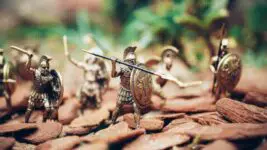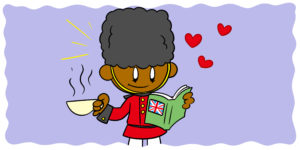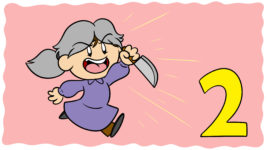It’s common knowledge that stories tend to only be as good as their characters. This means, unsurprisingly, that your protagonist needs to be great – they will need to develop as the plot progresses, be engaging and sympathetic (even if they’re not likable), and overcome challenges in a convincing and exciting manner. Writers often focus on pruning and improving their protagonists, pulling out their hair as they try to perfect the formula – but they’re focusing their attention in the wrong place.
That’s right – to improve your protagonist, it’s often best to focus on crafting a convincing supporting cast. Chief among these more minor characters is the mentor – the older, wiser friend who, in one way or another, ended up taking the protagonist under their wing.
You know mentor characters even if you’ve never thought about them before: think Ben Kenobi, Gandalf, Hagrid, Haymitch, and that guy who gave the word its meaning, Mentor from The Odyssey. Of course, your mentors don’t all need to be wise, old white dudes who nod sagely ever few seconds – in fact, it’s best if they’re not. But to understand how to write an engaging mentor, we have to examine the archetype in more detail…
The mentor and the hero’s journey
We’ve looked at writer and academic Joseph Campbell’s famous hero’s journey monomyth before, but it’s always worth returning to. In the hero’s journey, the mentor is the one who either guides the protagonist over the threshold between the ‘safe’ world and the ‘story’ world (as in The Hobbit and The Lord of the Rings) or else is the one who greets the protagonist as soon as they arrive (as in The Wizard of Oz).
The mentor either invites the protagonist into a new world or greets them as they arrive.Click To TweetIn this arrangement, the safe world is the one the hero has inhabited prior to the story’s beginning. This could be as obvious as Kansas in The Wizard of Oz or as niche and literary as the pre-story sitcom in George Saunders’s short story ‘Brad Carrigan, American’. The story world is where the plot occurs – it’s the dangerous unknown land bordered by the ‘threshold’ – think the wizarding world in Harry Potter and the ocean off of Ithaca in The Odyssey. If this idea is giving you trouble, you can check out Why Writers Like You Need To Know Their Key Event From Their First Plot Point for a fuller explanation.
The mentor is the one who equips the hero for his/her quest and who spells out the hero’s objective. They’re either a native of the story world or else are intimately familiar with it, and so are well placed to help the hero find his/her feet. Typically, they impart important lessons and principles to the hero that will prove instrumental in overcoming the obstacles the hero goes on to face.
The mentor plays a diminishing role as the story progresses, often finding him/herself distanced from the hero. Often, the mentor will die, forcing the hero to adapt and grow, but will linger in some form or another (think of Kenobi’s ghostly voice in Star Wars or Gandalf the White in The Lord of the Rings).
Ultimately, the hero’s journey lays down the stock image of the mentor. It’s a useful starting point, but if you’re going to really put together a convincing and engaging mentor, you’re going to want to break the mold.
Characteristics of the mentor
While I’ve extolled departing from the common archetypes of Campbell’s mentor, that’s not to say there aren’t characteristics common to nearly all effective mentor characters, and they’re not necessarily what you’d think. For example, a mentor need not be ‘wise’ in the traditional sense; they need only recognize the nature of the story world and the potential of the hero.
For example, Hagrid in Harry Potter can hardly be described as ‘wise’ in the book-smart sense; he’s no Dumbledore. Rather, he’s experienced, determined, and loyal, and he knows the quirks and truths of the wizarding world like the back of his hand. Similarly, he’s invested in Harry’s success and believes in his ability.
Hagrid, like many famous mentors, has also been in the hero’s shoes. The reader learns that he was once a student, just as Ben Kenobi was once an apprentice Jedi and Morpheus was once new to the world beyond the Matrix. This kind of experience can help explain a mentor’s value when traditional, archetypal wisdom (ala Gandalf or Dumbledore) is missing.
You can even layer mentors depending on their area of expertise – Hagrid is Harry’s mentor into the general wizarding world, while it could be argued that Dumbledore is his mentor in the specific good vs. evil struggle in which he’s eventually embroiled.
But beyond knowledge of the story world, investment in the protagonist’s success, and the ability to provide guidance and equipment for the hero as they cross the threshold between the safe and story worlds, there’re few ‘musts’ for your mentor. There are, however, several common characteristics shared by many prominent mentors. For example:
- Mentors are frequently rather disheveled individuals and many are outcasts or loners (think of Hagrid, Ben Kenobi, Gandalf, Hamitch, Abbé Busoni, etc.),
- Mentors are unable to solve the story’s big problem themselves, despite their insight,
- Common people tend to know of mentors by reputation,
- Mentors almost always force the hero to recognize their own talent,
- They tend to be trusted and relied upon by the hero,
- Mentors tend to keep secrets and/or withhold information from heroes.
This gives you a lot of freedom! Remember, a mentor needn’t be likeable, pleasant, or smart. They don’t need to get along with the hero, they don’t need to want to be a mentor, and they don’t even need to be working in the hero’s best interests (after all, Dumbledore didn’t tell Harry he’d likely have to die to defeat Voldemort, and Ben and Yoda kept the whole ‘Darth Vader is your father’ thing pretty hush-hush). They don’t even have to be ‘good guys’ – Emperor Palpatine is, in many ways, a mentor figure for Anakin.
Uses for the mentor
So we’ve seen what a mentor is – now, why would you actually want to use one? Well, if you’re looking to reiterate the essential narratives humans return to again and again (and it’s a good idea if you’re trying to produce a bestseller), a mentor is obligatory. Think of all the bestselling series of the past however-long: Harry Potter, The Hunger Games, Twilight, those Dan Brown novels… even Fifty Shades of Grey foregrounded a mentor figure!
But beyond the benefits of adhering to the hero’s journey, a mentor is a great way to effectively deliver information about your story world. After all, your hero is likely as new to the story world as the reader is, and a mentor character is a great way to integrate hefty chunks of exposition into dialogue, action, and narrative. You don’t have to look far to find examples of this; consider, for example, Gandalf speaking to Frodo in the early pages of The Fellowship of the Ring.
The Enemy still lacks one thing to give him strength and knowledge to beat down all resistance, break the last defenses, and cover all the lands in a second darkness. He lacks the One Ring.
– J.R.R. Tolkien, The Fellowship of the Ring
This would make for some clunky exposition, but it’s effective dialogue because it makes sense – Gandalf is, in this context, the teacher, and both Frodo and the reader are learning about the hitherto unknown story world.
The mentor is there to explain the plot/stakes/rules to the hero AND the reader.Click To TweetBeyond expressing information and pushing the plot onward, mentor characters can be used to dramatically alter the pace and mood of your novel. For example, while the mentor is around, things feel safe; their knowledge and guidance can be relied upon and, as such, there’s only so badly things can go. However, kill off or otherwise incapacitate the mentor, and it’s like the rug has been swept out – things have suddenly gotten very serious. Think of Gandalf’s dramatic ‘death’ at the hands of the Balrog in The Fellowship of the Ring – the novel’s pace speeds way up and the sense of danger is suddenly palpable. This can also be great for character development; with the mentor out for the count, the hero has to step up. The pupil must become the master.
Writing a good mentor
Now for the difficult part! Writing a good mentor requires a developed sense of restraint, in that mentors are a bit of a balancing act. If you make them too wise and powerful, they’ll steal attention from the hero and the reader will wonder why they aren’t the ones at the narrative’s center. However, the opposite is also true; too quiet, weak, or useless and their necessity begins to be called into question.
Make sure your mentor isn’t too helpful; kill them off quickly or bake in a serious flaw.Click To TweetIn general, it’s a good idea to make your mentor unique. Try to deviate from the stereotypical wise man and instead think of something original. Remember, a mentor is a person too, and shouldn’t just be a sage advice machine. Why opt for a Merlin-clone when you can instead have a streetwise urchin girl who hears voices but knows the sewers beneath the city like the back of her hand? Why not a young, morally questionable businessman who nonetheless knows the best way to the top? Or perhaps a roguish sailor who, despite a long history of alcoholism and injuries, is the only guy who knows the way across Ronar’s Strait?
Another thing to remember is that mentors tend to be more interesting when they’re flawed. Look at The Hunger Games’s Haymitch – a surly, sarcastic alcoholic who tolerates Katniss more than he likes her. After all, there needs to be a reason the mentor isn’t the hero – some flaw that prevents them from going it alone. On a similar note, mentors shouldn’t make a habit of coming to your hero’s rescue – that way lies the book-destroying trope that is deus ex machina. You can probably get away with it once, so long as it’s fatal and changes the mood sufficiently.
If you’re still struggling to define your mentor character, consider their potential relationship with your other characters. Can you create some interesting relationships by creating a certain type of mentor? Only experimentation and understanding your characters can give you the answer.
Finally, remember that it’s not the mentor’s job to tell the hero what to think – rather, they should teach your hero how to think. They should help develop your hero into someone wiser, more capable, and more principled.
So there we have it. Next time you’re struggling over a protagonist, why not consider the characters around them instead? An effective mentor could be the thing you need to develop your hero and push your story onward. For advice on casting a fantastic mentor, check out This Is The Blueprint For A Perfect Cast Of Characters, or try Why Writers Like You Need To Know Their Key Event From Their First Plot Point to find out more about how the mentor can ease your protagonist through the story. Who are your favorite mentors? Did I miss any tips? Let me know in the comments.






6 thoughts on “How (And Why) To Write A Mentor Character”
No poetry is bad poetry, Mr. Johnson, but everything is good if you write. 🙂
Excellent article. Thank you.
Ha, you’re right of course – the act of writing is always good, even if the products get binned. You’re welcome.
Insightful. I mentor/counsel people and I agree a mentor doesn’t have to reign perfect. I’m abit of a wanderer and I find immense satisfaction in walking alongside people if I don’t know where Iam going
Hi Sandra,
Thanks for the real-world mentor perspective! Best of luck with your writing.
Fred
This might be weird but, thank you for using that particular font . . . easy on the eyes when you’ve been reading a lot. The article was very insightful and helpful!
Ha! It’s funny how the little things can make a difference. You’re very welcome.
Best,
Fred